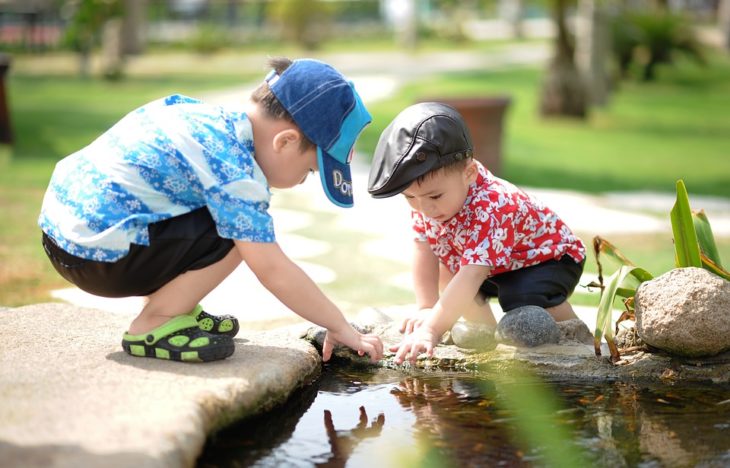While your child may be learning their ABCs and numbers at their preschool or kindergarten, one thing that schools have a difficult time teaching are soft skills, especially communication and emotional intelligence.
A classroom environment can help your child learn basic communication skills, such as how to raise their hand, say “please” and thank you, and listen to instructions. However, many important communication skills and other soft skills cannot be taught at schools.
The sad fact is, because of larger classroom sizes and lack of personal connection with each student, it’s impossible for most teachers to devote the one-on-one, personalized time it takes to demonstrate these soft skills to everyone in their classroom. Kindergarten is a great first step, but it alone won’t teach your child how to voice their emotions, practice active listening, or fully develop their language skills.
Contents
Why Soft Skills Are Important

Source: Pixabay
These and other soft communication skills are vital to success later in life. In fact, there have been numerous studies released that indicate this. Communication skills, empathy, emotional intelligence, understanding social cues, and more are all soft skills that employers look for in their next hires.
If your child possesses these soft skills, they are much more likely to be hired, find a job they love, and be successful in their career.
Soft skills are vital to your child’s personal and emotional lives too! Communication, empathy, emotional awareness, and self-esteem bring clarity and understanding to family, friend, and romantic relationships and tend to make us more satisfied with our lives in general.
The Bad News: You Can’t Teach Soft Skills
All that might sound pretty great, but there’s one major catch. The common consensus is that you can’t actually teach soft skills, at least not like you would teach your child their alphabet or their basic math.
As one emotional intelligence site points out, soft skills aren’t teachable because they’re not really “skills”, as we commonly define them. Soft skills may be better explained simply as personal benefits that come from possessing a strong awareness of ourselves and others.
While hard skills are trainable things, like how to use a computer or how to memorize a call script, soft skills are defined as “personal attributes that enable someone to interact effectively and harmoniously with other people.” In other words, it’s difficult to teach soft skills because they are personal traits, not skills.
On top of all that, soft skills are very difficult to measure, whether in school or education environments or in the career field. This makes it very difficult for educators and school board members to tell whether their efforts are making a difference.
But don’t lose hope! There are many things you can do to encourage your child to develop or learn these soft skills on their own. It just takes some creativity!
Things You Can Do As a Parent

Source: Herald Sun
As a parent, you’re in a great position to help your child develop these all-important soft skills of communication, emotional intelligence, and more!
The best thing you can do is be an example to your child and take every opportunity to help them discover what good communication is! Your child is always watching, learning, and mimicking behavior and words around them, whether that’s from you, their peers, or the TV they watch. You can take advantage of that to demonstrate soft skills that will be valuable to them later in life.
Here are three simple ways you can help your child develop these soft skills:

Source: Pixabay
Step 1: Spend Time Without Screens
Help your child unplug! Instead of letting them have unlimited time to watch TV or play games on a tablet or phone, regularly allow your children some exposure to life beyond the screen!
Letting your child spend time interacting with others will allow them to become familiar with social cues and good forms of communication. Letting them spend some “quiet time” playing by themselves will also help them to develop better emotional self-awareness.
Step 2: Play Make Believe
Most children love creative, imaginative play. Pretending to be a doctor, the president, or even a princess, are not only sources of fun and joy, but also great ways to learn important life skills!
Whether you’re playing with them yourself or taking them to a friend’s house or a playgroup so they can interact and play with peers, giving your child the gift of imaginative play will help them develop better soft skills.
Step 3: Listen to Your Child
Listening to your child is one of the most important things you can do to contribute to their personal development. There are several ways that you can create a safe and fun environment that will help your child learn to communicate their emotions and ideas.
Really listening to your child as they tell a story, talk about their ideas, or try to express a feeling will help them develop great soft skills through practice and affirmative action. And it all starts by simply listening to them and encouraging them to express themselves through open-ended questions.
How Educational Toys and Games Can Help Your Child Develop Soft Skills

Source: Ask Amy Doll
A great way to supplement make-believe games and real-life peer and parent interaction is to use toys and educational games.
Playing with dolls, stuffed animals, or learning toys can help your child learn language skills. This play will then translate to improved communication with others.
With the right toys and games, you can create a fun, no-pressure context in which to talk and bring up real-life conversational situations. By simply playing with toys, you can introduce children to important life concepts that will translate into soft skills.
One such toy I’ve found to help encourage soft skill development is the new Ask Amy Doll. It’s an educational toy that can help your child build communication skills, emotional intelligence, and self-confidence! By responding to vocal statements and questions, such as, “Do you like school?”, “Tell me a story”, or “Am I pretty”, this interactive doll’s answers will encourage soft skills like communication, positivity, self-esteem, and love of learning!
